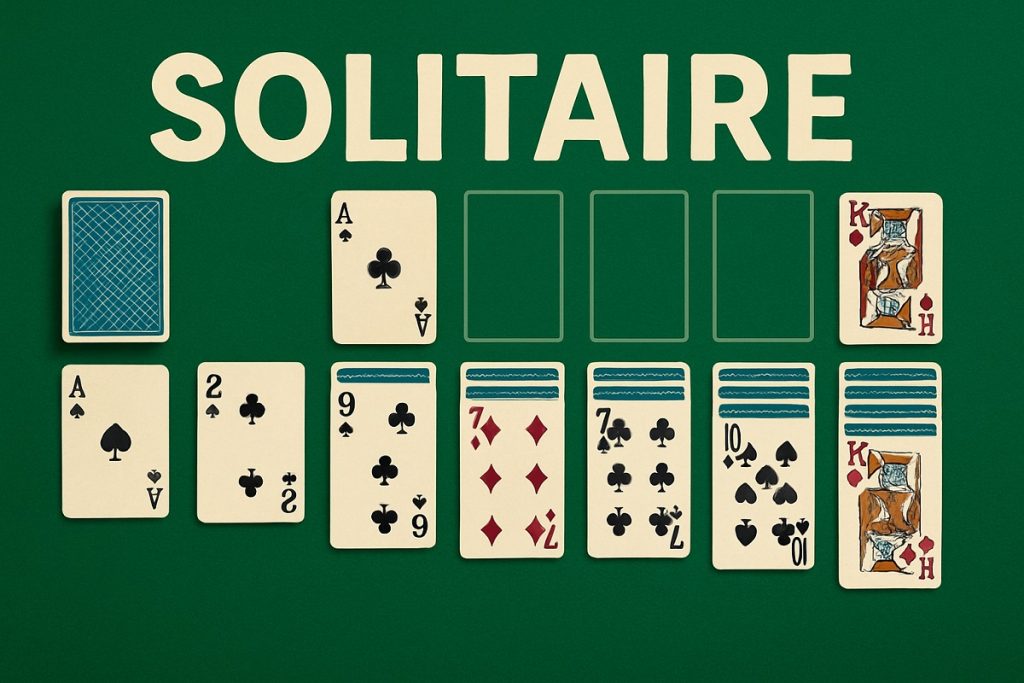Discover the timeless charm of solitaire with this in-depth guide that covers everything from rules to strategies. Learn how to play, win, and enjoy every version of this beloved card game.

Contents
What is Solitaire?
Solitaire is more than just a way to kill time. It’s a single-player card game that combines logic, patience, and a bit of luck. Known worldwide and played in countless variations, solitaire has endured for centuries—and for good reason. It’s engaging, relaxing, and wonderfully satisfying once you get the hang of it.
A Brief History of Solitaire
The origins of solitaire are somewhat fuzzy, but most historians trace its roots back to 18th-century Europe. Some believe it started as a form of fortune-telling, while others suggest it was simply a pastime for the aristocracy. Regardless of its beginnings, solitaire became wildly popular after being included in early versions of Microsoft Windows in the 1990s, introducing millions to the classic solitaire layout.
Basic Objective of Solitaire
The goal of most solitaire games is to sort a shuffled deck of cards into four foundation piles, each one organized by suit and in ascending order from Ace to King. Sounds simple? It is—and it isn’t. That’s the beauty of it.
Understanding the Classic Solitaire Setup
- Tableau: Seven columns of cards, with the first column containing one card, the second column two cards, and so on. Only the top card in each column is face-up initially.
- Stock: The remaining cards after the tableau has been dealt.
- Waste: Cards drawn from the stock and not yet played.
- Foundation: Four piles, one for each suit, starting with Aces and building up to Kings.
How to Play Solitaire: Step-by-Step
- Flip cards from the stock to the waste pile.
- Move cards between tableau columns in descending order and alternating colors (e.g., black 7 over red 8).
- Move cards to the foundation piles when possible.
- Only Kings (or piles starting with a King) can be moved into empty tableau columns.
- Continue this process until all cards are moved to the foundations—or you run out of moves.
Online Solitaire vs. Classic Solitaire
While classic solitaire with a physical deck still has its charm, online solitaire offers unmatched convenience. You can play solitaire anytime, anywhere, and never worry about shuffling cards or losing a Queen under the couch. Plus, many digital versions come with features like hints, undo buttons, and timers to help you improve your skills.
Benefits of Playing Solitaire
- Mental Clarity: It sharpens your focus and enhances problem-solving.
- Stress Relief: The solitary nature of the game is calming and meditative.
- Convenient: Especially in its free solitaire or online solitaire forms.
- No Setup Required: Especially when you play online.
Tips and Strategies to Improve Your Game
Want to go from novice to master? Here are some handy tips I’ve found useful:
- Always move an Ace or Two to the foundation as soon as possible.
- Reveal face-down cards in the tableau quickly—it unlocks new moves.
- Try to build evenly across the tableau to avoid emptying one column too soon.
- Use the undo button (in digital games) to learn from your mistakes.
- Don’t rush—sometimes the best move is to wait for a better option.
Popular Variants of Solitaire
Solitaire isn’t a one-size-fits-all game. There are dozens of variants, each offering a unique twist:
- Klondike: The most popular and what most people mean by “solitaire.”
- Spider: Uses two decks and is much more challenging.
- FreeCell: Known for requiring more skill than luck.
- Pyramid: A quick-play version that focuses on pairing cards to 13.
- TriPeaks: Combines elements of strategy and speed.
Common Mistakes to Avoid
We’ve all been there—one wrong move and the whole board collapses. Here’s what to watch out for:
- Focusing too much on building foundation piles without planning ahead.
- Not turning over tableau cards soon enough.
- Wasting time on stock cards without fully analyzing tableau possibilities.
- Moving cards to the foundation too early, limiting maneuverability.
Why Solitaire Has Endured
I think part of the magic of solitaire is its accessibility. No matter your age, background, or skill level, anyone can play solitaire. It’s both a mental challenge and a peaceful escape—a rare combination in today’s fast-paced world.
Should You Play Solitaire Online?
If you haven’t tried playing free solitaire online yet, you’re honestly missing out. Sites like solosolitaire.com offer sleek interfaces, ad-free experiences, and plenty of different game types. Whether you’re killing time on your commute or relaxing at home, it’s an ideal digital distraction.
Final Thoughts
Solitaire isn’t just a game; it’s a ritual for many of us. It’s a way to unplug, think clearly, and experience small, personal victories. Whether you prefer classic solitaire or want to explore new twists, there’s always something new to discover in this deceptively simple game.
Give it a try for yourself on solosolitaire.com and see just how satisfying a well-played round can be.
If you enjoyed this guide or found it helpful, feel free to share it or leave a comment. Happy playing!
What is your reaction to this?

 I liked it
I liked it Wonderful
Wonderful Thanks
Thanks Good
Good Hahaha !
Hahaha ! Incredible
Incredible Interesting
Interesting Wrong
Wrong
